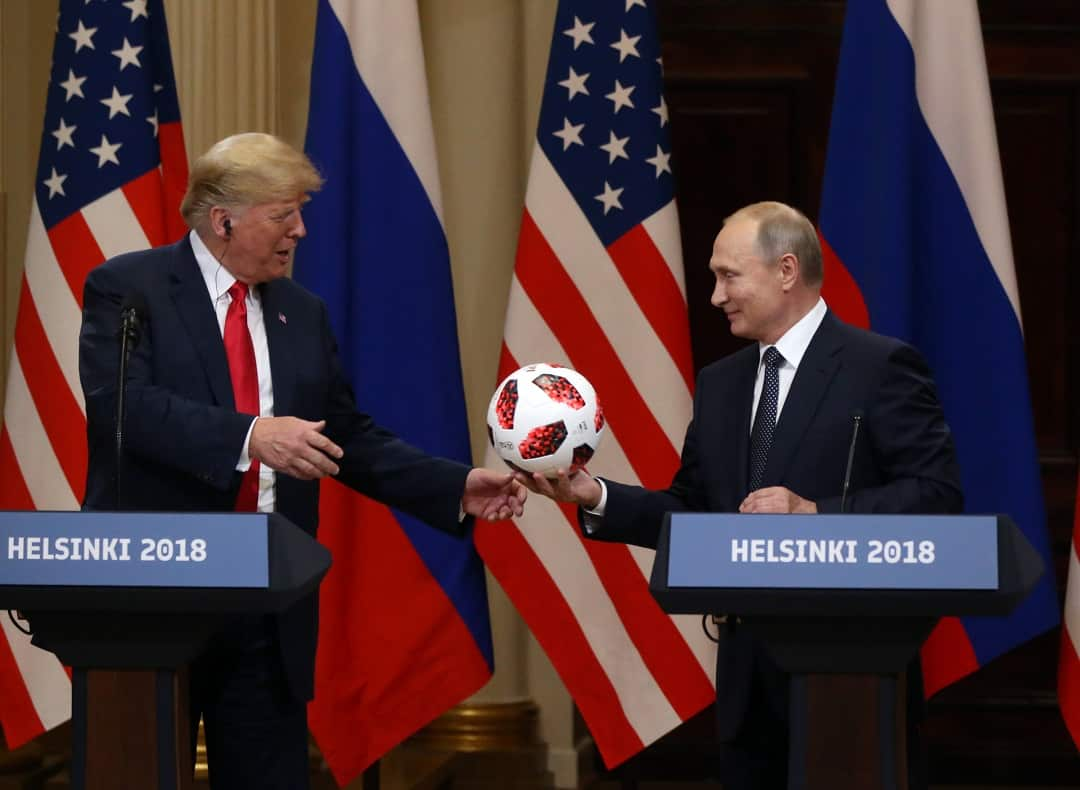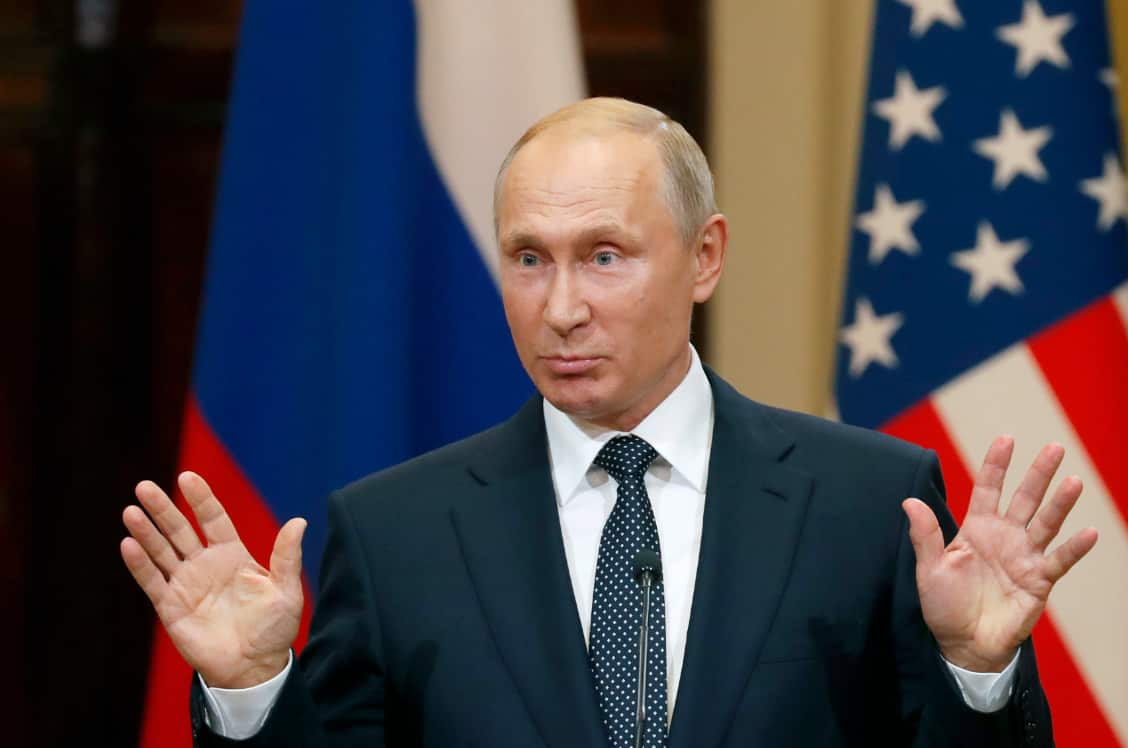Standing side-by-side with Vladimir Putin, US President Donald Trump has refused to blame the Russian leader for meddling in the 2016 elections, casting doubt on the findings of his own intelligence agencies and sparking a storm of criticism at home.
President Donald Trump refused to confront Vladimir Putin over meddling in the US election at their first face to face summit, publicly challenging the findings of the US intelligence community and triggering bipartisan outrage at home.
The US and Russian presidents came out of their meeting in Helsinki Monday expressing desire for a fresh start between the world's leading nuclear powers and more talk on global challenges, after discussing an array of issues from Syria, Ukraine and China to trade tariffs and the size of their nuclear arsenals.
There were indications of an arrangement to work together and with Israel to support a ceasefire in southern Syria, suggesting that the US administration is backing off its demand that Moscow's ally Bashar al-Assad step down.
If that is anathema to many in Washington, Trump's apparent concessions to Putin over the election controversy drew stinging condemnation from across the political divide.
Standing alongside the Kremlin boss at a joint news conference, Trump acknowledged that his intelligence chiefs believe Russia hacked and leaked Democrats' emails containing politically damaging information about his rival Hillary Clinton in 2016.
But, insisting he had won the race fair and square, the wealthy property tycoon said: "I have President Putin, he just said it is not Russia. I will say this: I don't see any reason why it would be."
Friday's US indictment of 12 Russian military intelligence agents exploded with embarrassing timing for Trump as he prepared to meet Putin. On Monday, officials said another Russian agent had been arrested for seeking to influence US politics.

But the US leader insisted that his counterpart had delivered a "powerful" denial of any Russian manipulation, and that the investigation by special counsel Robert Mueller was proving a "disaster" for the United States.
Trump again denied any collusion between his campaign and the Kremlin, while Putin insisted: "The Russian state has never interfered and is not planning to interfere in the USA's internal affairs."
As criticism mounted, Trump tweeted from Air Force One on his way home from Finland that he had "GREAT confidence in MY intelligence people".
"However, I also recognize that in order to build a brighter future, we cannot exclusively focus on the past – as the world’s two largest nuclear powers, we must get along."
Angry criticism of his disavowal of his own intelligence agencies came even from within Trump's Republican Party.
Senior Republican Senator John McCain was particularly scathing, saying: "Coming close on the heels of President Trump's bombastic and erratic conduct towards our closest friends and allies in Brussels and Britain, today's press conference marks a recent low point in the history of the American presidency."
Director of National Intelligence Dan Coats distanced himself from his boss, issuing a statement saying the US intelligence community's judgment that Russia interfered in the 2016 election was "clear".
But the top Democrat in the US Senate, Chuck Schumer, tweeted that many Americans can only wonder if "the only possible explanation for this dangerous behaviour is the possibility that President Putin holds damaging information over President Trump."
And former CIA director John Brennan said Trump's behavior at the news conference "rises to & exceeds the threshold of 'high crimes & misdemeanors.' It was nothing short of treasonous."
Putin denied the notion that Russian spy bosses may hold compromising information on Trump, who in his previous business career oversaw the Miss Universe pageant in Moscow in 2013.
"Please get this rubbish out of your heads," the Russian leader said.
In a post-summit interview with Fox News, Putin said US-Russia relations should not be held "hostage" to "internal political games," referring to the Mueller probe.
The two leaders appeared relaxed at the Helsinki news conference, smiling on occasion, in contrast to their sombre demeanour at the start of the day.
Trump, bent on forging a personal bond with the Kremlin chief despite the election allegations, went into the summit blaming the "stupidity" of his predecessors for plunging ties to their present low.
His manner towards Putin was also a contrast to the anger Trump flashed at NATO allies at a combative summit of the alliance in Brussels last week, which critics said would only hearten Putin.

A post-NATO trip to Britain, supposedly America's partner in a "special relationship", was riddled with controversy as well.
In Helsinki, however, Trump was determined to accentuate the positive, as was Putin.
Republican backlash
Trump also received backlash for the comments from his own party.
Former Speaker of the House Newt Gingrich tweeted that this was the "most serious mistake of his presidency".
Senior Republican Senator John McCain called the joint press conference "disgraceful" and a "low point" for the US presidency.
In some of the harshest criticism yet from members of Trump's party, the veteran lawmaker - a strong critic of the president - said the Helsinki summit was a "tragic mistake" in which Trump was "not only unable, but unwilling to stand up to Putin".
"Coming close on the heels of President Trump's bombastic and erratic conduct towards our closest friends and allies in Brussels and Britain, today's press conference marks a recent low point in the history of the American Presidency," McCain said in a statement
"No prior president has ever abased himself more abjectly before a tyrant."
[This] marks a recent low point in the history of the American Presidency. John McCain
While Paul Ryan, the top Republican in the US House of Representatives, called on Trump to accept that Russia is not an ally of the United States and must be held accountable for meddling in the 2016 election.
"The president must appreciate that Russia is not our ally," Ryan said, after Trump refused to criticise President Vladimir Putin in a joint press conference following their Helsinki summit.
"There is no moral equivalence between the United States and Russia, which remains hostile to our most basic values and ideals," Ryan, the House Speaker, said in a statement. "The United States must be focused on holding Russia accountable and putting an end to its vile attacks on democracy."
While Republican Senator Jeff Flake said, "I never thought I would see the day when our American president would stand on the stage with the Russian president and place blame on the United States for Russian aggression. This is shameful".
Additional reporting: AFP

